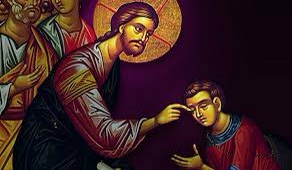Holy Unction

The mystery of Holy Unction or the Sacrament of the Anointing of the sick is also called euchelaeon and means “blessed oil.” This sacrament is the Church’s specific prayer for healing.
When we are ill and in pain, this can very often be a time of life when we feel alone and isolated.
Holy Unction reminds us that when we are in pain, either physical, emotional, or spiritual, Christ is present with us through the ministry of His Church. He is among us to offer strength to meet the challenges of life, and even the approach of death.
Christ came to the world to “bear our infirmities.” One of the signs of His divine Messiahship was to heal the sick. The power of healing remains in the Church because Christ himself remains in the Church through the Holy Spirit.
As with Chrismation, oil is also used in this Sacrament as a sign of God’s presence, strength, and forgiveness.
The sacrament is conducted on Holy Wednesday afternoon, or at any other time deemed necessary.
Ideally seven priests are gathered, but it can be performed by a few, or even one priest.
After the reading of seven Epistle lessons, seven Gospel lessons and the offering of seven prayers, which are all devoted to healing, the priest anoints the body with the Holy Oil. He makes the sign of the cross on the forehead and top and palms of the hands saying “For the healing of soul and body.”
The biblical basis for the Sacrament is found in James 5:14-15:
“Is any among you sick, let him call for the presbyters of the church, and let them pray over him, anointing him with oil in the name of the Lord; and the prayer of faith will save the sick man, and the Lord will raise him up; and if he has committed sins, he will be forgiven.”
The express purpose of the Sacrament of Holy Unction is healing and forgiveness.
As Orthodox Christians we pray, neither commanding God to heal or doubting His ability to heal, but pleading for His promised mercy upon all who are ill.
Since it is not always the will of God that there should be physical healing, the prayer of Christ that God’s will be done always remains as the proper context of the Sacrament.
It is indeed the case that death inevitably comes. All must die, even those who in this life are given a reprieve through healing in order to have more time on the earth.
Thus, the healing of the sick is not itself a final goal, but is merely “instrumental” in that it is given by God as a sign of His mercy, and as a grace for the further opportunity of man to live for Him, and for others in the life of this world.
Source: Lychnos April-May 2020
